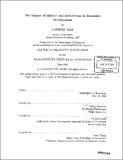The impact of history and institutions on economic development
Author(s)
Lakshmi Iyer
DownloadFull printable version (9.412Mb)
Other Contributors
Massachusetts Institute of Technology. Dept. of Economics.
Advisor
Abhijit Banerjee and Esther Duflo.
Terms of use
Metadata
Show full item recordAbstract
This thesis examines the impact of political and legal institutions on economic development. The thesis consists of three studies analyzing specific historical and current institutions. The first chapter examines the impact of colonial rule on economic outcomes. I compare areas in India which were under the direct control of British administrators with areas which were ruled by local Indian rulers under indirect colonial control. Controlling for potential selection bias in British annexation policy, I find that British-ruled areas have significantly lower levels of public goods in the post-colonial period. These differences were present in the colonial period itself, and are narrowing after the end of colonial rule, suggesting the importance of local administrative control in the provision of public goods. The second chapter (co-authored with Abhijit Banerjee) focuses on the land revenue systems instituted by British colonial rulers for the collection of land revenue in India. We find that areas in which proprietary rights in land were historically given to landlords have significantly lower agricultural investments and productivity in the post-colonial period, compared to areas in which land rights were given to the cultivators. We verify that these differences are not driven by omitted variables or endogeneity of the historical institutions. They probably arise because of different post-colonial policy choices: landlord-dominated areas seem to have concentrated more on reducing inequality, while non-landlord areas do better at poverty reduction. The third chapter (co-authored with Quy-Toan Do) examines the impact of the 1993 Land Law in Viet Nam, which gave households the power to exchange, transfer, lease, inherit and mortgage their land-use rights. (cont.) We use a difference-in-differences estimation strategy to identify the impact of this law, taking advantage of the variation across provinces in the issuance of land-use certificates needed to enforce these rights. Our results indicate that the additional land rights led to significant increases in the share of total cultivated area devoted to multi-year crops, as well as some increase in irrigation investment. Overall, the results suggest a strong and long-lasting impact of property rights institutions and historical factors on economic development.
Description
Thesis (Ph. D.)--Massachusetts Institute of Technology, Dept. of Economics, 2003. Includes bibliographical references (p. 129-133).
Date issued
2003Department
Massachusetts Institute of Technology. Department of EconomicsPublisher
Massachusetts Institute of Technology
Keywords
Economics.